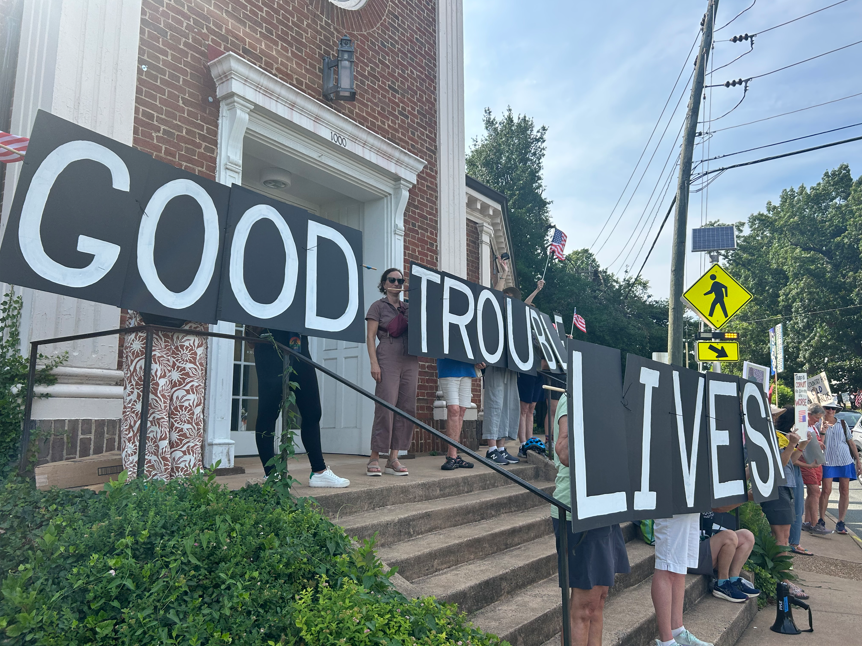CHARLOTTESVILLE, VA (CVILLE RIGHT NOW) – “Get in good trouble, necessary trouble.”
These now-iconic words from the late John Lewis are more than a call to action for activists in the Charlottesville, they’re a blueprint for moral clarity in times of chaos. In the midst of a shifting political landscape his enduring legacy feels not just relevant, but essential to many in the community and, Thursday, many took time out to honor it on the fifth anniversary of his death.
Indivisible Charlottesville hosted a Celebration of Life at Booker T. Washington Park and over 200 people attended.
Rev. Cass Bailey of Trinity Episcopal Church was one of many speakers at the event who asked the audience a profound question.
“Why do we go on?” Bailey asked. “After being nearly beaten to death on that bridge in Selma, Lewis didn’t retreat. He chose to keep going. Love requires strength and perseverance. Unless we are grounded, unless we know the answer to that question of why, our efforts will be fruitless.”
Charlottesville City Council member and Indivisible co-founder Michael Payne reminded the crowd of advocacy’s urgency.
“We live in a time when fundamental institutions like Medicaid, Medicare, Social Security, are under threat. ICE raids have ramped up. Economic disparity has deepened. Voter suppression laws quietly erode democracy,” said Payne. “These aren’t abstract issues, but they are lived experiences for millions of Americans. These are depressing times, but the memory of John Lewis is that change only happens through sustained organizing over years.”
As Payne warned, local governments are becoming the frontlines in resisting federal overreach. Whether it’s protecting affordable housing or resisting surveillance partnerships with ICE, communities must rise together, using both grassroots momentum and institutional pressure, a strategy Lewis was known for.
Lewis was a civil rights leader and U.S. Congressman who fought for racial justice and equality. He helped lead the 1965 Selma marches, was badly beaten on “Bloody Sunday” and later served in congress for over 30 years until his death, becoming known as the “conscience of the Congress.”
Barbara Ruddy, a longtime local activist, reflected on her journey along the Civil Rights Trail, where she retraced Lewis’s steps across the Edmund Pettus Bridge.
“This was a deeply moving, powerful and most humbling experience,” she said. “Walking those steps brought it all to life.”
Ruddy’s message to today’s activists was direct.
“Listen very quietly and very closely for the voice of John Lewis whispering in your ear,” she said. “Use your voice for the person next to you who doesn’t have a voice. Lewis didn’t wait for the perfect moment; he made the moment matter.”
Sage Bradburn of Indivisible Charlottesville reminded the crowd that Lewis’s life is proof that change is possible.
“Many people are only now engaging politically because ‘real trouble’ has arrived. But Lewis’s example teaches that this work is a marathon, not a sprint,” Bradburn told Cville Right Now. “The civil rights activists’ courage and their grace and their organization and the fact that they did this out of peace and love and with so much courage. It gives you a lot of hope.”
Hope can seem elusive in today’s polarized and often hostile political environment. But Lewis’s life offers a powerful counter-narrative that even amid systemic uncertainty, progress is possible through collective, compassionate resistance.
At the heart of Lewis’s legacy is the power of the collective. As Payne emphasized, “We are in a movement moment.”
“The issues of today require the same fierce, organized coalition-building that marked the Civil Rights Movement,” he said. “Lewis didn’t just march. He legislated. He mentored. He built bridges, literally and metaphorically.
Payne’s call for a mass movement that “unites people across class lines, racial lines, gender” is not just aspirational, but it is necessary to complete what Lewis called “the great unfinished legacy of the Civil Rights Movement,” the fight for economic and social freedom.
“Honoring John Lewis today means more than celebrating his life. It means living his value,” said Bradburn. “It means standing up when it’s uncomfortable, speaking out when it’s dangerous, and building coalitions when division is easier. It means understanding that the fight for justice, equality, and democracy is not an historical artifact. It is a living, breathing demand on each of us.”
As Lewis once said, “Never, ever be afraid to make some noise and get in good trouble, necessary trouble.”
“That power now belongs to us,” said Ruddy. “Let’s not waste it.”



